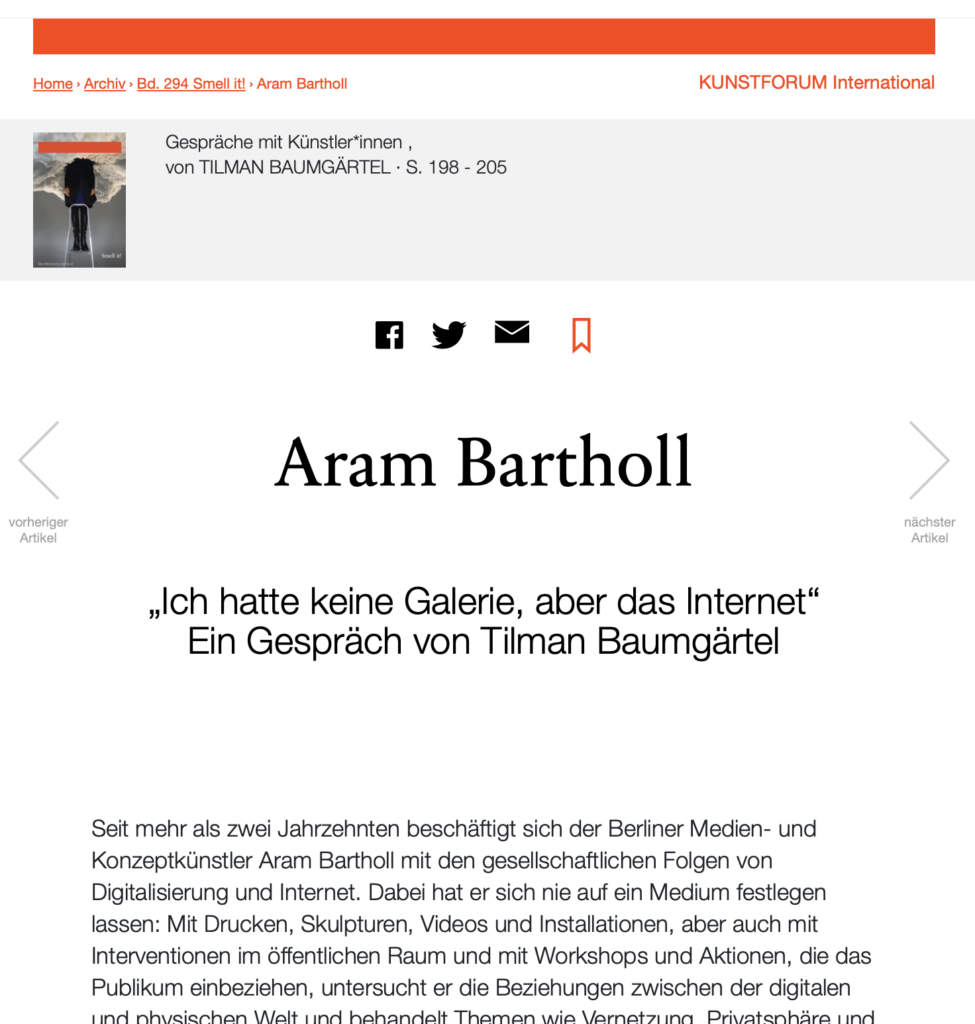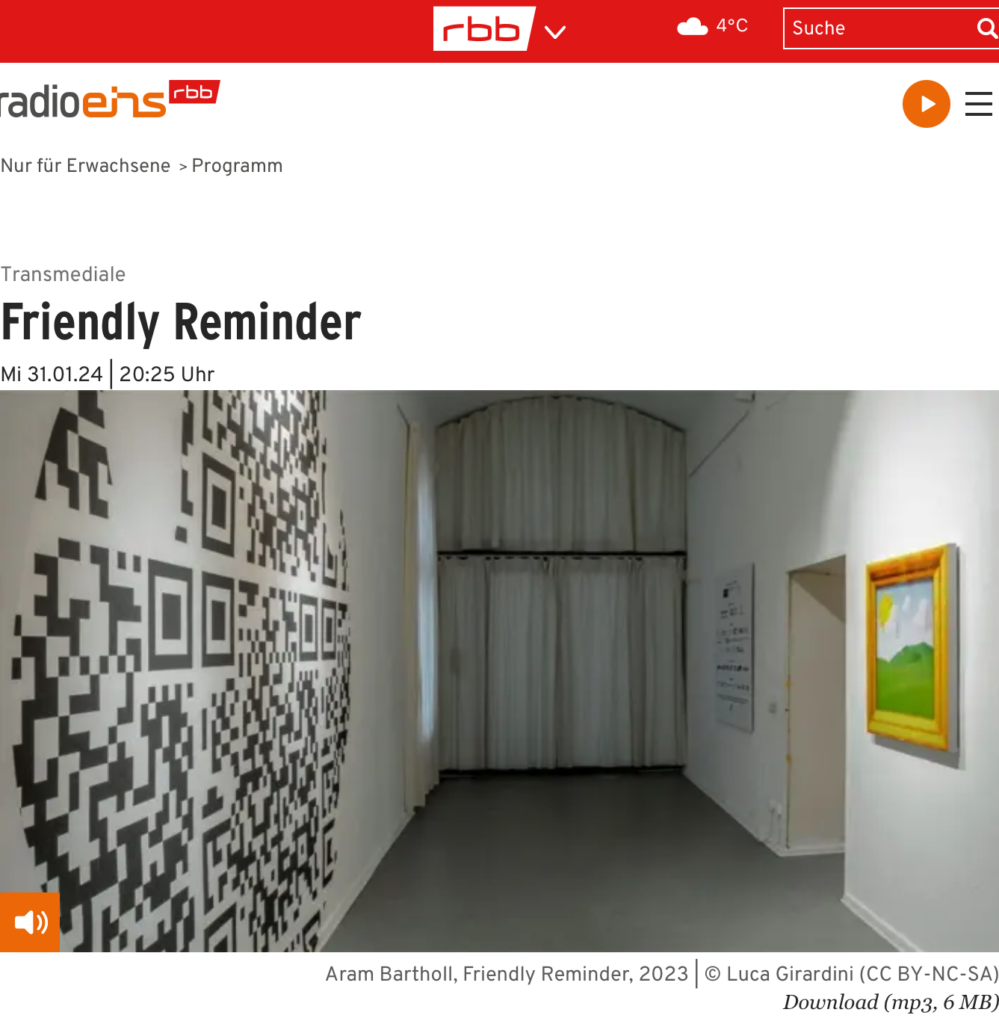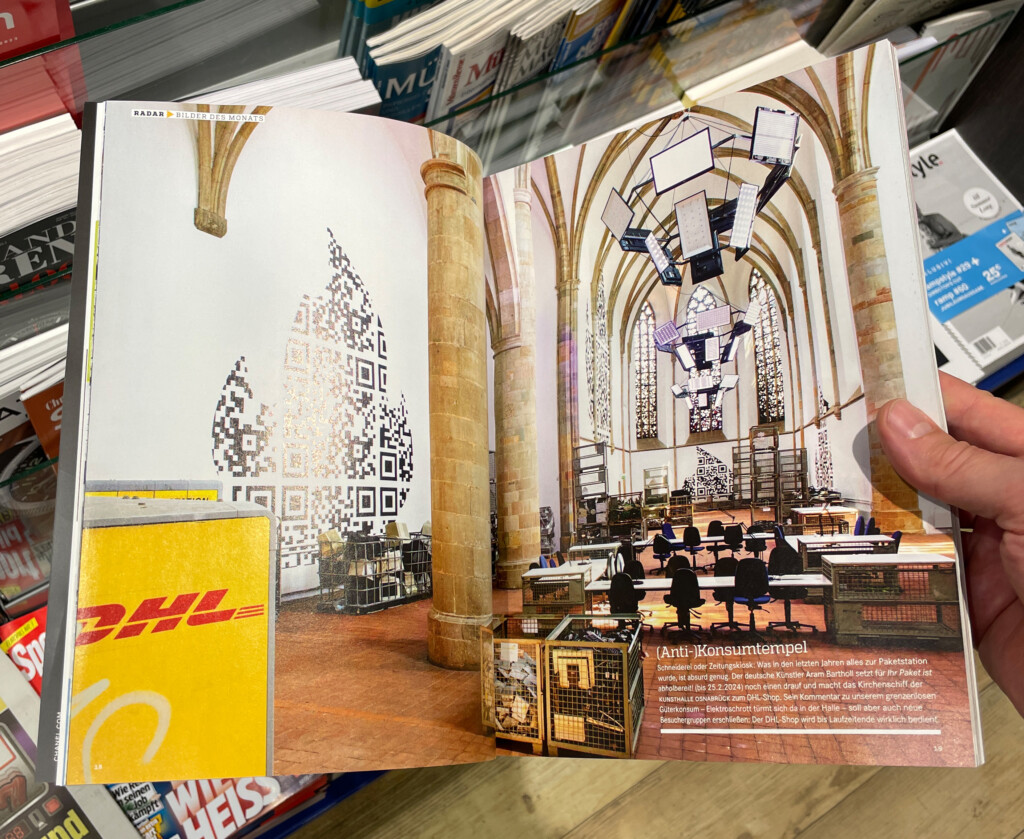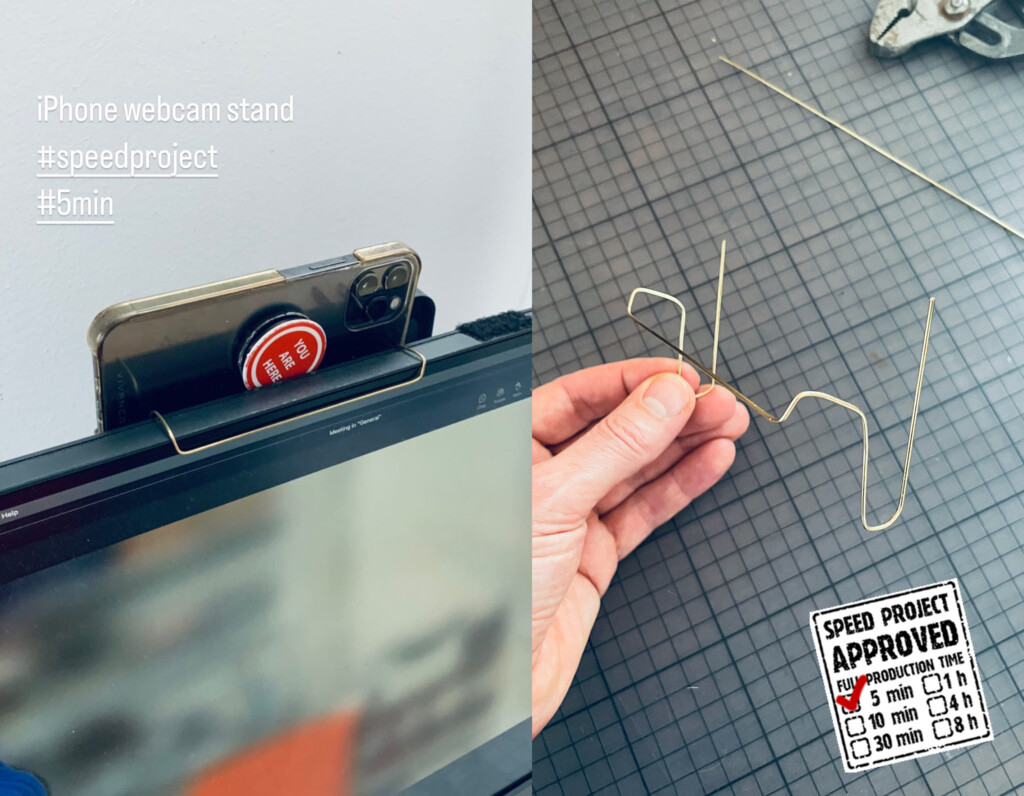
Transkript der Radionsendung Deutschlandfunk Kultur Fazit, Beitrag von Anette Schneider vom 9.7.2023
Anmoderation:
Die Kunsthalle Osnabrück feiert aktuell mit mehreren Ausstellungen und Projekten ihr 30-jähriges Jubiläum. Unter anderem verhüllte der ghanaische Künstler Ibrahim Mahama ein leerstehendes Kaufhaus mit alten Jutesäcken, die auf koloniale Handelsströme hindeuten. Die Aktion war auch schon in anderen Städten zu sehen. Der Clou des Programms findet aber in der Kunsthalle selbst statt. Das ist eine über 700 Jahre alte Kirche, die nun der Künstler Aram Bartholl bespielt. Bartholl hat schon versenkte Leihfahrräder aus der Spree gefischt, USB-Sticks in Fassaden zementiert oder Handytaschen aus Abschirm-Flies genäht. Immer geht es in seinen Arbeiten um die Verbindung zwischen der physischen und der digitalen Welt. In der ehemaligen Kirche in Osnabrück hat Bartholl jetzt eine DHL-Packstation installiert. Annette Schneider war für Fazit dort.
Anette Schneider:
Die hohe gotische Hallenkirche ist angefüllt mit Altmetall-Containern. Sie ziehen sich die Wände des langen Kirchenschiffes bis zum einstigen Chor entlang, nebeneinander aufgereiht, in Gruppen platziert oder vier Meter hoch übereinander gestapelt. Insgesamt 70 Stück. Darin Elektroschrott. Echter Elektroschrott. Von einem Osnabrücker Recyclinghof geliehen und entsprechend sauber und penibel sortiert. Am Eingang ganze Fernseher, Computer und Bildschirme, dann Bildschirmreste, Kabel, Luftfilter und ganz hinten im Chor geschredderte Festplatten. Am anderen Ende des Kirchenschiffs befindet sich eine DHL-Packstation. Davor stehen Arbeitstische und Stühle. Und weil sich in Aram Bartholls Installationen oft immer noch eine überraschende Wendung verbirgt, wird es auch hier noch irrer.
AB: „Wir stehen ja quasi zwischen einer Packstation, die aktiviert ist, von der Menschen aus Osnabrück ihre Pakete abholen und gleichzeitig aber hier die ausrangierten Fernseher sehen und sich auch vielleicht Gedanken machen, wie lange hält denn so ein elektronisches Gerät und wie viel Elektromüll produzieren wir eigentlich?“
Beleuchtet wird das Szenario von drei unter der hohen Decke installierten gigantischen Kronleuchtern aus Bildschirmen ohne Displays, deren gleißendes Licht der Überwachung zu dienen scheint. Auf jeden Fall erlaubt es keinerlei Ablenkung von dem, was einen umgibt. Ein Recyclinghof mit unserem Luxus Wohlstandsmüll. Großartiger ist die Kirche wohl noch nie bespielt worden, als mit ihrer Verwandlung in einen Elektro-Schrott-Tempel, der alle aktuellen gesellschaftlichen Diskussionen zusammenführt. Die über Nachhaltigkeit und Ressourcenverschwendung, über Konsumgier, Energiefraß und Wegwerfmentalität und über ein profitgeiles Wirtschaftssystem, das für immer neue Produkte Mensch und Natur immer weiter ausbeutet und zerstört.
AB: „Die Konsumtempel sind ja die Elektro-Kaufhäuser, Apple Shop usw. und hier haben wir jetzt den Tempel für die Dinge, wenn sie dem Müll zugeführt werden und wir haben eben auch viele Geräte, die in der Datenverarbeitung benutzt werden, also Computer, Bildschirme und das macht die ganze Diskussion auf um Kommunikation bei uns in unserer heutigen Gesellschaft mit der Entwicklung des Internets, der Social-Media-Plattformen der letzten Jahrzehnte, die einen sehr starken Einfluss auf die Diskussionen heute haben.“
Seit Jahren beschäftigt sich Aram Bartholl mit den gesellschaftlichen Folgen von Digitalisierung und sozialen Medien mit Überwachung und Manipulation. Erstaunlicherweise und zum Glück für seine Studierenden an der Hamburger Hochschule für angewandte Wissenschaften entstehen daraus keine albtraumhaften Endzeitszenarien. Vielmehr entwickelt er dank einer kritisch aufklärerischen Grundhaltung Installationen, Aktionen und Workshops, die sarkastisch und witzig unsere Abhängigkeiten und Verhaltensweisen entlarven und die bei genauem Hinsehen oft subversive Möglichkeiten eröffnen, um das vermeintlich unabänderliche zu unterminieren. So erfand er zur Bekämpfung unserer Handysucht und als Schutz vor Abhörmaßnahmen ein Funkloch zum Selbernähen. Er markierte im öffentlichen Raum mit weißen Linien Handyzonen sowie die Raucherzonen auf den Bahnsteigen. Oder er initiierte ein mittlerweile weltweites Netzwerk, bei dem zum Datenaustausch jenseits des Internets USB-Sticks in Häusermauern betoniert wurden. Gegen dieses widerständige Potenzial wirkt die gewaltige Schrottinstallation in Osnabrück fast, als hätte ihn die Übermacht von Elon Musk und Co. nun doch resignieren lassen.
AB: „Ich finde es gar nicht so resignierend. Ich finde den Schrott sehr ästhetisch und es findet auch eine Aktivierung statt. Das heißt, man kann diesen Elektroschrott auch benutzen und es werden Workshops stattfinden. Also es ist jetzt nicht quasi nur der tote Friedhof, sondern auch ein lebendiger Ort.“
Bei freiem Eintritt und die Idee eines produktiven Reparaturcafés für alle ist dann eben doch wieder ein klassischer Bartholl, der leichthändig künstlerische Installation und Aktivismus miteinander verbindet. Das setzt sich sogar noch an den Kirchenwänden fort, auf die riesige QR-Codes gemalt sind. Wie energiefressende Höllenfeuer der Digitalisierung flammen sie die Wände empor und natürlich haben auch sie es in sich. Etwa der hinter dem einstigen Chor.
AB: „Wenn sie den mal ausprobieren mit ihrem Handy, dann wird ihr E-Mail-Client aufpoppen und eine vorgeschriebene E-Mail an Olaf Scholz erscheinen, wo ich schon was reingeschrieben habe. Aber da können sie auch noch Dinge ergänzen und die wird tatsächlich an sein Wahlkreisbüro geschickt. Es ist tatsächlich die Frage nach dem Klimakanzler. Wo ist er denn, der uns versprochen wurde zur Wahl? Und so gibt es so kleine Funktionen, die sich hinter diesen QR-Codes verbergen.“
Mutig, dass die Kunsthalle den Künstler einfach machen ließ. Das Ergebnis jedenfalls ist ungemein erfrischend, weil so konstruktiv gegen die herrschenden Verhältnisse gerichtet.
Moderation:
Ihr Paket ist abholbereit bis zum 25. Februar 2024 in der Kunsthalle Osnabrück.
https://www.deutschlandfunkkultur.de/ihr-paket-ist-abholbereit-aram-bartholl-in-der-kunsthalle-osnabrueck-dlf-kultur-f99ef257-100.html




 Piggyback, an stand to attach the iphone as webcam to the desktop screen made from a single piece of wire. 5 min #
Piggyback, an stand to attach the iphone as webcam to the desktop screen made from a single piece of wire. 5 min #